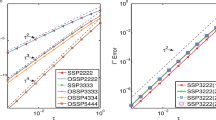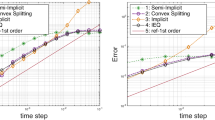Abstract
It is difficult to design high order numerical schemes which could preserve both the maximum bound property (MBP) and energy dissipation law for certain phase field equations. Strong stability preserving (SSP) Runge–Kutta methods have been developed for numerical solution of hyperbolic partial differential equations in the past few decades, where strong stability means the non-increasing of the maximum bound of the underlying solutions. However, existing framework of SSP RK methods can not handle nonlinear stabilities like energy dissipation law. The aim of this work is to extend this SSP theory to deal with the nonlinear phase field equation of the Allen–Cahn type which typically satisfies both maximum bound preserving (MBP) and energy dissipation law. More precisely, for Runge–Kutta time discretizations, we first derive a general necessary and sufficient condition under which MBP is satisfied; and we further provide a necessary condition under which the MBP scheme satisfies energy dissipation.
Similar content being viewed by others
Data availibility
Enquiries about data availability should be directed to the authors.
References
Shu, C.-W.: Total-variation-diminishing time discretizations. SIAM J. Sci. Stat. Comput. 9, 1073–1084 (1988)
Gottlieb, S., Ketcheson, D.I., Shu, C.-W.: Strong Stability Preserving Runge-kutta and Multistep Time Discretizations. World Scientific Press, Singapore (2011)
Gottlieb, S., Shu, C.-W.: Total variation diminishing Runge-Kutta schemes. Math. Comput. 67, 73–85 (1998)
Kraaijevanger, J.F.B.M.: Contractivity of Runge-Kutta methods. BIT 31, 482–528 (1991)
Ruuth, S.J., Spiteri, R.J.: Two barriers on strong-stability-preserving time discretization methods. J. Sci. Comput. 17, 211–220 (2002)
Gottlieb, S., Shu, C.-W., Tadmor, E.: Strong stability-preserving high-order time discretization methods. SIAM Rev. 43, 89–112 (2001)
Allen, S.M., Cahn, J.W.: A microscopic theory for anti-phase boundary motion and its application to anti-phase domain coarsening. Acta Metall. 27, 1085–1095 (1979)
Eyre, D.J.: An unconditionally stable one-step scheme for gradient systems. unpublished, see http://www.math.utah.edu/eyre/research/methods/stable.ps
Gomez, H., Hughes, T.: Provably unconditionally stable, second-order time-accurate, mixed variational methods for phase-field models. J. Comput. Phys. 230, 5310–5327 (2011)
Ju, L., Li, X., Qiao, Z., Zhang, H.: Energy stability and error estimates of exponential time differencing schemes for the epitaxial growth model without slope selection. Math. Comp. 87, 1859–1885 (2018)
Shen, J., Xu, J., Yang, J.: A new class of efficient and robust energy stable schemes for gradient flows. SIAM Rev. 61, 474–506 (2019)
Xu, C., Tang, T.: Stability analysis of large time-stepping methods for epitaxial growth models. SIAM J. Numer. Anal. 44, 1759–1779 (2006)
Du, Q., Ju, L., Li, X., Qiao, Z.: Maximum bound principles for a class of semilinear parabolic equations and exponential time differencing schemes. arXiv preprint: arXiv:2005.11465, to appear in SIAM Review (2020)
Du, Q., Ju, L., Li, X., Qiao, Z.: Maximum principle preserving exponential time differencing schemes for the nonlocal Allen-Cahn equations. SIAM J. Numer. Anal. 57, 875–898 (2019)
Li, B., Yang, J., Zhou, Z.: Arbitrarily high-order exponential cut-off methods for preserving maximum principle of parabolic equations. SIAM J. Sci. Comput. 42(6), 3957–3978 (2020)
Stehlik, P., Volek, J.: Maximum principles for discrete and semidiscrete reaction-diffusion equation. Discrete Dyn. Nat. Soc. 2015, 1–13 (2015)
Fu, Z., Yang, J.: Energy-decreasing exponential time differencing runge-kutta methods for phase-field models. J. Comput. Phys. 454, 110943 (2022)
Shen, J., Tang, T., Jiang, Y.: On the maximum principle preserving schemes for the generalized Allen-Cahn equation. Comm. Math. Sci. 14(6), 1517–1534 (2016)
Tang, T.: Revisit of semi-implicit schemes for phase-field equations. Anal. Theory Appl. 36(3), 235–242 (2020)
Tang, T., Yang, J.: Implicit-explicit scheme for the Allen-Cahn equation preserves the maximum principle. J. Comput. Math. 34(5), 471–481 (2016)
Shu, C.-W., Osher, S.: Efficient implementation of essentially non-oscillatory shock-capturing schemes. J. Comput. Phys. 77, 439–471 (1988)
Butcher, J.C.: Numerical Methods for Ordinary Differential Equations. Wiley, New Jersey, U.S (2003)
Ferracina, L., Spijker, M.N.: Stepsize restrictions for the total-variation-diminishing property in general runge-kutta methods. SIAM J. Numer. Anal. 42(3), 1073–1093 (2004)
Gong, Y., Wang, Q., Wang, Y., Cai, J.: A conservative Fourier pseudo-spectral method for the nonlinear Schrödinger equation. J. Comput. Phys. 328, 354–370 (2017)
Yang, J., Du, Q., Zhang, W.: Uniform \(l^p\) -bound of the Allen-Cahn equation and its numerical discretization. Int. J. Numer. Anal. Model. 15(1–2), 213–227 (2018)
Acknowledgements
The work of J. Yang is supported by National Natural Science Foundation of China (NSFC) Grant No. 11871264, Natural Science Foundation of Guangdong Province (2018A0303130123), the Shenzhen Natural Science Fund (RCJC20210609103819018), and NSFC/Hong Kong RRC Joint Research Scheme (NFSC/RGC 11961160718).
Funding
The authors have not disclosed any funding.
Author information
Authors and Affiliations
Corresponding author
Ethics declarations
Competing Interests
The authors have not disclosed any competing interests.
Additional information
Publisher's Note
Springer Nature remains neutral with regard to jurisdictional claims in published maps and institutional affiliations.
Rights and permissions
About this article
Cite this article
Fu, Z., Tang, T. & Yang, J. Energy Plus Maximum Bound Preserving Runge–Kutta Methods for the Allen–Cahn Equation. J Sci Comput 92, 97 (2022). https://doi.org/10.1007/s10915-022-01940-6
Received:
Revised:
Accepted:
Published:
DOI: https://doi.org/10.1007/s10915-022-01940-6




